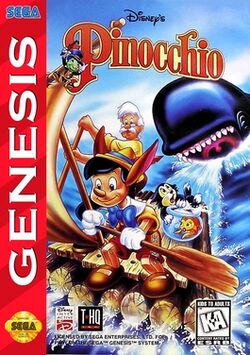Software:Pinocchio (video game)
| Disney's Pinocchio | |
|---|---|
 Sega Genesis cover art | |
| Developer(s) |
|
| Publisher(s) |
|
| Director(s) | Dan Marchant |
| Producer(s) |
|
| Designer(s) | Dan Marchant |
| Programmer(s) | Mike Ball |
| Artist(s) | Kevin Oxland |
| Composer(s) | Allister Brimble |
| Platform(s) | |
| Release | |
| Genre(s) | Puzzle Adventure |
| Mode(s) | Single-player |
Disney's Pinocchio is a platform puzzle adventure game from Virgin Interactive. It was released in 1996 for the Game Boy, Super NES, and Sega Genesis and is based on Walt Disney's animated feature film Pinocchio, originally released in 1940. The game was published by Capcom in Japan for the Super Famicom on the same year. A Sega 32X version of the game was made and completed, but was not released due to the add-on's limited popularity.
Storyline
The game uses intertitles between levels to convey the story, in the form of a children's storybook. Pinocchio travels from home and must choose to go to School or Easy Street (though the choice does not affect the level order). He then travels from Stromboli's marionette show to Pleasure Island and then into the sea, where he saves Geppetto from inside Monstro and they escape.
Reception
| Reception | ||||||
|---|---|---|---|---|---|---|
| ||||||
Coach Kyle of GamePro gave the Genesis version a negative review, commenting that both the gameplay design and controls are shallow and rudimentary, the character animations are stiff, and the graphics lack detail. He concluded: "What a shame that such a long-awaited game, with such a famous story as a foundation, should turn out to be so disappointing".[3][lower-alpha 1] The Feature Creature, however, gave the Game Boy version a mixed review, saying it simply translates the simplistic and easy levels from the Genesis version into portable form.[2][lower-alpha 2]
Notes
References
- ↑ "16-Bit's Last Stand". Electronic Gaming Monthly (Ziff Davis) (89): 193. December 1996.
- ↑ 2.0 2.1 The Feature Creature (January 1997). "Handhelds for the Holidays! (Pinocchio)". GamePro (IDG) (100): 45. https://archive.org/details/GamePro_Issue_100_Volume_09_Number_01_1997-01_IDG_Publishing_US/page/n45/mode/2up. Retrieved October 13, 2022.
- ↑ Coach Kyle (January 1997). "Pinocchio (Genesis)". GamePro (IDG) (100): 122. https://archive.org/details/GamePro_Issue_100_Volume_09_Number_01_1997-01_IDG_Publishing_US/page/n123/mode/2up. Retrieved October 13, 2022.
External links
 |

